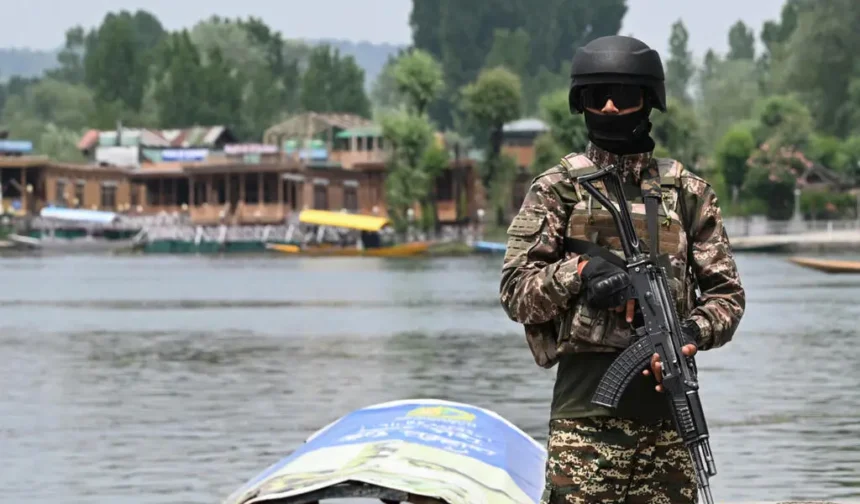Pakistan’s military spokesman is reported by the country’s state TV to have stated that Indian forces have used missiles to attack Pakistan in three different locations. The Reuters news agency has also received reports of deafening explosions and intense shelling in the border areas of the Pakistan-administered state of Kashmir.
Following a fatal militant attack on tourists in Kashmir last month, the relationship between India and Pakistan has experienced a significant decline. India has accused Pakistan of supporting cross-border terrorism, a charge that Islamabad categorically denies.
Please remain with us, as we will provide you with the most recent news and analysis from our correspondents on the ground.
Pakistan has pledged to respond to this “cowardly assault.”.
Islamabad will respond to this [attack] at a time and location of its choosing, according to a spokesperson for the Pakistani military.
“All of our air force jets are airborne.” The attack is a cowardly and shameful assault that was perpetrated from within India’s airspace,” the spokesman further states.
Nine sites are being targeted in India, according to a government statement.
According to the Indian government, its forces have initiated “Operation Sindoor” with the objective of “targeting terrorist infrastructure” in Pakistan and Pakistan-administered Kashmir, “from which terrorist attacks against India have been planned and directed.”
Indian officials have declared that “nine sites have been targeted” in a statement.
“Our actions have been non-escalatory, measured, and focused.” No military facilities in Pakistan have been targeted. India has exhibited a significant amount of caution in its selection of targets and execution method.
The Pakistani military has reported that Indian air operations have affected three locations.
The statement also claims that the order for the assault came after last month’s deadly militant attack on tourists in Indian-administered Kashmir.
According to the director general of Pakistan’s military public relations branch, Inter-Service Public Relations (ISPR), three locations have been struck by Indian missiles, as reported by Pakistani news channel Geo TV.
According to Lt Gen. Ahmed Sharif Chaudhry, they are Muzaffarabad and Kotli in Pakistan-administered Kashmir, as well as Bahawalpur.
Tensions between the two countries
The ongoing tensions between India and Pakistan, primarily centred around the disputed region of Kashmir, have deep historical roots and remain a significant geopolitical issue. Both nations, nuclear-armed and sharing a contentious border, have experienced recurring conflicts since their partition in 1947.
The conflict traces back to the 1947 partition of British India, which created India and Pakistan. Kashmir, a Muslim-majority region ruled by a Hindu monarch, became a flashpoint when the ruler acceded to India amid tribal incursions from Pakistan.
This led to the first Indo-Pakistani war (1947–48), resulting in a UN-mediated ceasefire and the establishment of the Line of Control, dividing Kashmir between Indian-administered Jammu and Kashmir and Pakistan-administered Azad Jammu and Kashmir.
The two nations fought additional wars over Kashmir in 1965 and 1971, with a significant skirmish in 1999 (Kargil War). The Line of Control remains heavily militarised, with frequent ceasefire violations.
The India-Pakistan tensions following the April 22, 2025, Pahalgam attack represent a dangerous escalation, with risks of military confrontation and nuclear miscalculation. While historical precedents suggest both sides may pull back from the brink, the suspension of the Indus Waters Treaty and mutual military posturing introduce new uncertainties.
International diplomacy, particularly from the U.S., Russia, and the UN, will be critical to preventing a broader conflict. However, the underlying Kashmir dispute and domestic pressures in both nations ensure that tensions will persist, with Kashmiris bearing the heaviest cost.
While global powers urge restraint, their influence is constrained. The U.S. is distracted by other conflicts (e.g., Israel-Gaza, Russia-Ukraine), and President Trump’s disengagement (evidenced by his vague comment about “1,500 years” of tensions) suggests limited appetite for deep involvement. Russia’s mediation offer may be complicated by its alignment with India and China’s with Pakistan.
Related News:
Tensions Escalate Between Pakistan and India After Kashmir Massacre

Salman Ahmad is known for his significant contributions to esteemed publications like the Times of India and the Express Tribune. Salman has carved a niche as a freelance journalist, combining thorough research with engaging reporting.












